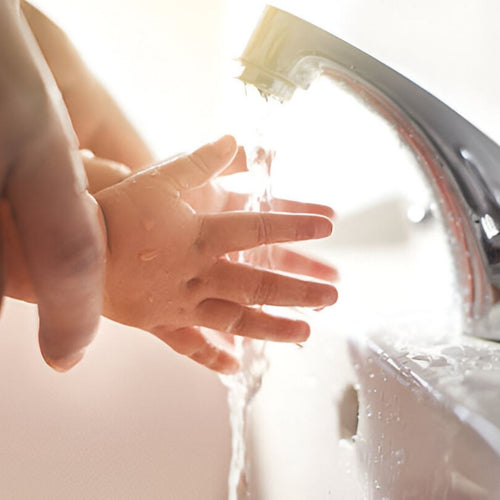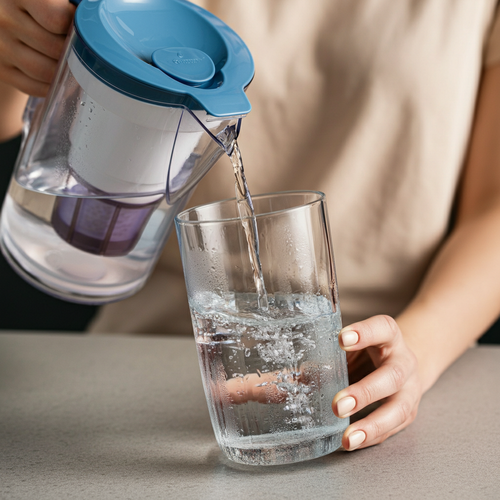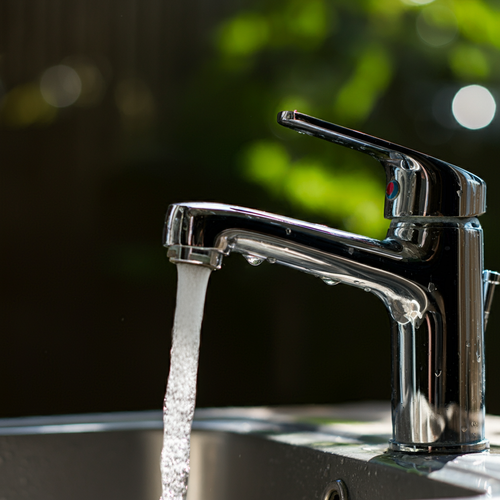Why Do You Need a Water Softener?
Hard water, a common water issue in many households, can cause numerous problems, including:
✓ Scale buildup: Hard water minerals accumulate on fixtures, appliances, and pipes, causing reduced water flow, inefficient heating, and potential appliance breakdowns. A 2021 study by the Water Quality Research Foundation found that hard water can increase energy costs by up to 25% due to scale buildup in water heaters.
✓ Soap scum: Hard water reacts with soap, creating a sticky residue that leaves bathtubs, sinks, and showers looking dingy and feeling slippery.
✓ Dry skin and hair: The minerals in hard water can strip away natural oils from skin and hair, leading to dryness, itchiness, and irritation.
✓ Damaged appliances: Hard water can shorten the lifespan of appliances like dishwashers, washing machines, and coffee makers due to mineral buildup.
A water softener effectively removes these hard water minerals, resulting in:
✓ Enhanced cleaning: Soaps and detergents lather more effectively, requiring less product and leaving surfaces cleaner.
✓ Softer skin and hair: Reduced mineral content in water alleviates dryness and improves the feel of skin and hair.
✓ Extended appliance lifespan: Soft water prevents scale buildup, protecting appliances from premature wear and tear.
To determine if a water softener is right for your home, test your water hardness using a home test kit or contact a local water treatment professional.
What is a Water Softener & How Does it Work?
A water softener is a home appliance that removes hardness minerals, primarily calcium and magnesium, from your water supply. It works through a process called ion exchange, which involves the following steps:
- Resin Tank: Water flows through a tank filled with resin beads coated with sodium ions.
- Ion Exchange: Hard water minerals (calcium and magnesium) attach themselves to the sodium ions on the resin beads, releasing sodium into the water.
- Softened Water: The softened water, now rich in sodium and low in hardness minerals, flows out of the tank and into your home's plumbing system.
- Regeneration: When the resin beads become saturated with hardness minerals, the softener automatically enters a regeneration cycle. This typically involves flushing the tank with a concentrated salt solution (brine) to remove the accumulated minerals and recharge the resin beads with sodium ions.
Here's a quote from the Water Quality Association (WQA) to illustrate the effectiveness of ion exchange:
"Ion exchange is a highly effective and proven technology for removing hardness minerals from water. Studies have shown that water softeners can reduce hardness by up to 99%."
Key Components of a Water Softener:
✓ Resin Tank: Holds the resin beads responsible for ion exchange.
✓ Brine Tank (Salt-Based Systems): Stores the concentrated salt solution used for regeneration.
✓ Control Valve: Manages the water flow and regeneration cycle.
✓ Meter (Optional): Tracks water usage and triggers regeneration based on water volume.
Understanding these components will help you choose the right water softener for your needs and ensure its optimal performance.
Salt-Based Water Softeners: The Traditional Choice
Salt-based water softeners are the most common type and utilize the ion exchange process described in the previous section. They offer several advantages:
Advantages of Salt-Based Water Softeners:
✓ High Effectiveness: Proven to remove up to 99% of hardness minerals, significantly improving water quality.
✓ Readily Available: Widely available in various sizes and capacities to suit different household needs.
✓ Cost-Effective: Generally more affordable than other types of softeners, particularly over the long term.
Disadvantages of Salt-Based Water Softeners:
✓ Requires Salt Refill: Regular refilling of the brine tank is necessary, adding a maintenance task.
✓ Sodium Increase: Replacing calcium and magnesium with sodium can slightly increase the sodium content of drinking water, though typically within acceptable limits for most individuals.
✓ Maintenance Needs: Regular cleaning and occasional replacement of resin beads are required.
Choosing the Right Salt-Based Softener:
Consider the following factors when selecting a salt-based softener:
✓ Water Hardness: Higher hardness levels require a greater capacity softener.
✓ Household Water Usage: Choose a softener with sufficient capacity to handle your daily water consumption.
✓ Budget: Salt-based softeners vary in price depending on size, features, and brand.
✓ Features: Consider options like automatic regeneration, smart technology control, and efficiency ratings.
A 2022 survey by Consumer Reports found that salt-based softeners remain the most popular choice due to their effectiveness, affordability, and widespread availability.
Salt-Free Water Softeners: An Alternative for Health Concerns
While salt-based softeners reign supreme, some users seek alternatives due to sodium concerns or environmental considerations. Enter salt-free water softeners!
Advantages of Salt-Free Water Softeners:
✓ No Sodium Added: Ideal for individuals on sodium-restricted diets or wanting to avoid sodium increase in drinking water.
✓ Minimal Maintenance: No salt refill or brine tank cleaning required, simplifying upkeep.
✓ Eco-Friendly: No brine discharge, making them a greener option for environmentally conscious users.
Disadvantages of Salt-Free Water Softeners:
✓ Lower Effectiveness: Generally remove 50-80% of hardness minerals compared to 99% for salt-based options.
✓ Higher Upfront Cost: Can be more expensive than salt-based softeners initially.
✓ May Not Be Suitable for Very Hard Water: Might not be effective in areas with extremely high water hardness levels.
Types of Salt-Free Softeners:
✓ Template-Assisted Crystallization (TAC): Uses a template media to encourage controlled precipitation of hardness minerals, reducing their ability to cause scale buildup.
✓ Chelation: Employs chelating agents that bind to hardness minerals, preventing them from adhering to surfaces.
✓ Magnetic Softeners: Generate a magnetic field that supposedly alters the structure of hardness minerals, making them less likely to form scale. However, their effectiveness is debated and scientifically unproven.
Choosing the Right Salt-Free Softener:
Carefully assess your water hardness level and desired level of softening as effectiveness varies across technologies. Consider the upfront cost and weigh it against the benefits of avoiding sodium and reducing maintenance needs.
Remember, salt-free softeners may not be a suitable replacement for salt-based options in areas with very hard water.
Dual-Tank Water Softeners: Continuous Soft Water Supply
For those who demand uninterrupted soft water flow and can accommodate a larger system, dual-tank water softeners offer a premium solution.
Advantages of Dual-Tank Water Softeners:
✓ Continuous Soft Water: While one tank undergoes regeneration, the other remains online, ensuring a constant supply of softened water.
✓ Longer Lifespan: Alternating regeneration reduces stress on individual tanks, potentially extending their lifespan.
✓ Ideal for Large Households: Suitable for homes with high water usage or multiple bathrooms where maintaining consistent soft water flow is crucial.
Disadvantages of Dual-Tank Water Softeners:
✓ Higher Cost: Dual-tank systems are significantly more expensive than single-tank models.
✓ Larger Size Requirement: They occupy more space due to the two tanks and require careful installation planning.
✓ More Complex Maintenance: Both tanks require periodic maintenance, involving cleaning and potential resin replacement.
Choosing the Right Dual-Tank Softener:
Consider your water hardness, household water usage, available space, and budget when making a decision. Consult a water treatment professional for recommendations and proper sizing of a dual-tank system for your specific needs.
A 2021 study by the National Institute of Standards and Technology (NIST) highlighted the efficiency and reliability of dual-tank softeners, particularly for large commercial or industrial applications requiring consistent soft water flow.
Choosing the Right Water Softener for Your Needs
Navigating the diverse world of water softeners can feel overwhelming. But fear not! By considering these key factors, you can confidently choose the system that best fits your home and lifestyle:
Factors to Consider When Choosing a Water Softener:
✓ Water Hardness Level: This is the most crucial factor. Test your water hardness to determine the necessary level of softening. Higher hardness calls for a more powerful system.
✓ Household Water Usage: Estimate your daily water consumption to choose a softener with sufficient capacity. Insufficient capacity leads to frequent regeneration cycles, impacting efficiency and lifespan.
✓ Budget: Water softeners vary in price depending on type, size, features, and brand. Determine your budget and prioritize features that matter most to you.
✓ Space Constraints: Consider the available space for installation. Single-tank models are compact, while dual-tank systems require more space.
✓ Maintenance Needs: Different types require varying levels of maintenance. Salt-based systems need salt refills, while salt-free options have minimal upkeep.
✓ Health Concerns: If sodium intake is a concern, prioritize salt-free options or consult a doctor to assess the potential impact of softened water on your diet.
✓ Environmental Impact: Eco-conscious individuals may prefer salt-free or dual-tank systems for reduced brine discharge.
Resources for Informed Decisions:
- Water Quality Association (WQA): Provides educational resources and certification programs for water treatment professionals.
- Consumer Reports: Offers unbiased product reviews and comparisons of water softeners.
- Local Water Treatment Professionals: Can test your water, recommend suitable systems, and provide installation guidance.
Remember, choosing the right water softener is an investment in your home's comfort and efficiency. Take your time, research thoroughly, and consult with professionals if needed. A well-chosen water softener will reward you with years of soft, scale-free water, enhancing your daily life and protecting your appliances.
Installation & Maintenance of Water Softeners
Now that you've chosen the perfect water softener, let's explore the installation and maintenance aspects to ensure its optimal performance and lifespan:
DIY vs. Professional Installation: What's Right for You?
Whether you tackle it yourself or call in the pros depends on your skill level, comfort with plumbing tasks, and warranty considerations.
Considerations for DIY Installation:
✓ Skill Level: Basic plumbing knowledge and experience are necessary to handle connections, bypass valves, and initial system settings.
✓ Tools and Materials: Ensure you have the necessary tools for cutting pipes, tightening connections, and applying plumbing tape.
✓ Time Commitment: Proper installation can take several hours, depending on your existing plumbing configuration and system complexity.
✓ Warranty Coverage: Some manufacturers void warranties if the system is not installed by a certified professional.
Benefits of Professional Installation:
✓ Expertise & Efficiency: Licensed plumbers ensure proper installation, minimizing the risk of leaks or malfunctioning.
✓ Warranty Protection: Most manufacturers require professional installation to maintain warranty coverage.
✓ Peace of Mind: Leave the complex plumbing work to the professionals and enjoy immediate access to soft water.
Maintaining Your Water Softener for Optimal Performance
Like any appliance, routine maintenance is key to keeping your water softener running smoothly and delivering consistent results.
Regular Maintenance Tasks:
✓ Checking Salt Levels (Salt-Based Systems): Monitor the brine tank and refill it regularly to prevent regeneration issues.
✓ Cleaning Filters: Sediment and mineral buildup can clog filters, reducing efficiency. Clean or replace filters according to the manufacturer's recommendations.
✓ Monitoring Performance: Track water flow and softener output to identify potential issues like reduced softening effectiveness or increased regeneration frequency.
Troubleshooting Common Issues:
✓ Low Water Flow: Check for clogged filters, faulty valves, or inadequate salt levels (salt-based systems).
✓ Leaks: Inspect connections for tightness and potential wear. Consult a plumber if necessary.
✓ Decreased Softening Effectiveness: Consider factors like increased water usage, regeneration cycle issues, or possible resin exhaustion requiring replacement.
Extending the Lifespan of Your Softener:
✓ Proper Maintenance: Regular upkeep ensures smooth operation and minimizes wear and tear.
✓ Quality System: Invest in a well-built softener from a reputable brand for better durability and longevity.
✓ Water Quality Monitoring: Regular water testing helps identify potential contaminants that could harm the softener's performance or lifespan.
By following these maintenance tips and addressing any issues promptly, you can extend the lifespan of your water softener and enjoy soft, clean water for years to come.
Additional Considerations: Myths & Concerns about Water Softeners
Choosing a water softener can be a journey into a world of technical terms and conflicting information. Let's navigate some commonly encountered concerns and shed light on some prevailing myths about these helpful appliances:
Addressing the Sodium Concern:
While salt-based softeners replace hardness minerals with sodium, the increase in drinking water is typically minimal and within acceptable limits for most healthy individuals.
The World Health Organization (WHO) guidelines for daily sodium intake are set at 2,000 mg, and a typical softened water glass may contain around 10-20 mg of additional sodium.
For individuals with strict sodium-restricted diets or specific health concerns, consulting a doctor or dietician is recommended to assess the potential impact of softened water on their dietary needs.
Dispelling Myths about Magnetic Softeners:
Magnetic softeners, despite their claims, lack scientific evidence to support their effectiveness in removing hardness minerals. Studies conducted by organizations like the National Science Foundation (NSF) have found no measurable impact on water hardness through magnetic treatment.
Therefore, salt-based and salt-free softeners remain the recommended options for reliable and proven hardness removal.
Water Softener Impact on Plumbing & Appliances:
Contrary to popular belief, water softeners generally do not harm properly installed and maintained plumbing systems. In fact, by mitigating scale buildup, they can protect pipes and appliances from corrosion and extend their lifespan.
However, it's essential to choose a system compatible with your existing plumbing materials and consult a plumber if you have any concerns or require specific recommendations.
A Real User Experience:
"We installed a salt-based softener a year ago, and the difference is amazing! Our dishes come out sparkling clean, the shower feels softer, and our skin doesn't get as dry anymore.
We haven't noticed any significant change in water taste, and the minimal sodium increase hasn't impacted our health concerns." - Sarah K., homeowner in Chicago, IL
This quote illustrates the positive experiences many users have with water softeners, highlighting the tangible benefits they offer in terms of improved water quality and appliance performance.
Conclusion: Embracing Soft Water, Informed & Empowered
Choosing a water softener can transform your home experience, bidding farewell to scale buildup, dry skin, and dingy dishes. This guide has equipped you with the knowledge and insights to navigate the diverse world of softeners and confidently pick the perfect fit for your needs.
Key Takeaways:
✓ Understand your water: Testing your water hardness is the first crucial step. Knowing your enemy paves the path to victory, in this case, sparkling soft water.
✓ Types and trade-offs: Salt-based, salt-free, and dual-tank systems each offer unique advantages and disadvantages. Consider your water hardness, budget, and desired level of maintenance to make an informed decision.
✓ DIY or pro?: Assess your skill level and warranty considerations before deciding between tackling installation yourself or enlisting the expertise of a plumber.
✓ Maintenance matters: Regular upkeep, from checking salt levels to cleaning filters, ensures optimal performance and extends the lifespan of your softener.
✓ Myth busting: Don't fall for the magnetic trap! Salt-based and salt-free softeners remain the proven champions of hardness removal. Embrace science, not pseudoscience.
✓ Invest in comfort: A water softener is an investment in your home's comfort, efficiency, and appliance longevity. The benefits – soft, scale-free water, cleaner dishes, and happier skin – will speak for themselves.
Remember, choosing a water softener is a personal journey. This guide has equipped you with the knowledge and resources to embark on that journey with confidence. So, go forth, embrace the world of soft water, and enjoy the transformative difference it brings to your daily life.
Let's not forget about these overlooked information too:
✓ Environmental impact: Consider eco-friendly options like salt-free or dual-tank systems to minimize your environmental footprint.
✓ Technological advancements: Modern softeners offer smart features like automatic regeneration and water usage monitoring for enhanced convenience and efficiency.
✓ Local water treatment professionals: These experts can provide invaluable guidance on choosing and installing the perfect softener for your specific needs and water conditions.


















![Aldex Premium 10% Cross Link Resin for Water Softener [High Capacity]-SoftPro® Water Systems](http://www.softprowatersystems.com/cdn/shop/files/Aldex_10_Cross_Link_Resin_Premium_High_Capacity_for_Water_Softener_600x.jpg?v=1735853599)























